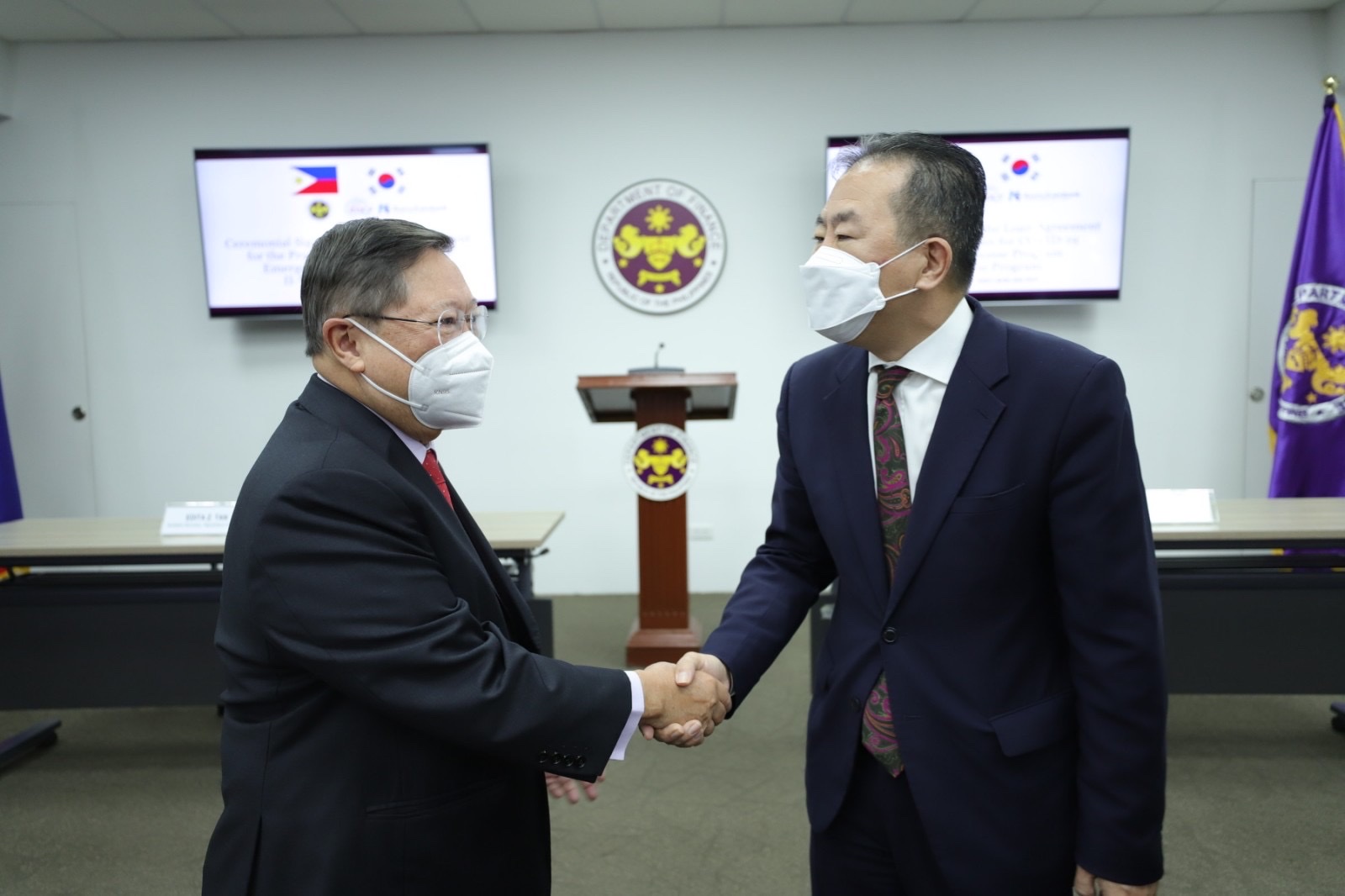More loans, grants for PH vaccines, disaster preparedness

Finance Sec. Carlos Dominguez III and South Korean Ambassador to the Philippines Kim Inchul during the signing of a $100 million loan agreement seen to boost the Philippine government’s COVID-19 vaccination program. Photo courtesy of the Korean Embassy in Manila.
MANILA, Philippines — Some more loans have been extended by multilateral banks and bilateral development partners to the Philippines so it can buy booster and pediatric shots as well as better prepare against disasters.
Finance Secretary Carlos Dominguez III on Friday confirmed that the board of directors of the Beijing-based Asian Infrastructure Investment Bank (AIIB) on Thursday night approved its $250-million additional financing for the ongoing second health system enhancement to address and limit COVID-19 under the Asia-Pacific vaccine access facility (Heal 2) project.
Together with the also $250-million co-financing approved by the Manila-based Asian Development Bank (ADB) early this week, the Heal 2 project currently being implemented by the Department of Health (DOH) will have a total of $553.7 million in funds, with the remainder to be shelled out by the Philippine government.
In March, the AIIB extended a $300-million loan for Heal 2, under its COVID-19 crisis recovery facility, to the Philippines for vaccine procurement — the China-led bank’s first-ever loan for its member countries’ vaccination programs.
Next week, the World Bank’s Washington-based board will approve its $300-million additional loan for the Philippines to buy more vaccines for next year. In all, the government will borrow $800 million to purchase millions of COVID-19 vaccine doses intended as additional protection to healthcare workers, senior citizens, as well as younger children, once health authorities approve their vaccination against the deadly coronavirus.
The proposed P5.02-trillion 2022 national budget had set aside P45 billion in unprogrammed funds, which will be spent on additional vaccine doses.
Unprogrammed appropriations either came from foreign borrowings or excess revenues, the latter of which the government still does not have yet as revenue collections had been badly hit by the pandemic-induced economic slump.
Also on Friday, Dominguez on behalf of the Philippine government and Export-Import Bank of Korea-Economic Development Cooperation Fund (Kexim-EDCF) Philippines country chief representative Jaejeong Moon on behalf of South Korea signed a $100-million loan covering the second phase of the Program Loan for COVID-19 Emergency Response Program-Vaccination Program (PLCERP II).
South Korean Ambassador to the Philippines Kim Inchul joined the signing ceremony.
This second tranche of the South Korean loan will “help secure financial sustainability and fill the budgetary gap in implementing the DOH’s national COVID-19 vaccination program,” the Department of Finance’s (DOF) international finance group said in a statement.
“This financial assistance from Korea will go a long way in helping the Duterte administration rev up its mass vaccination program against COVID-19 that is crucial to the strong rebound by our domestic economy come 2022,” Dominguez said in a joint statement released by the DOF and the Korean Embassy in the Philippines.
For his part, Kim said South Korea will continue to support the Philippine government in its efforts to address the COVID-19 pandemic.
“I am happy to join this meaningful ceremony of signing the loan agreement. Through this agreement, Korea is able to make a further contribution to the Philippine government’s tireless efforts to combat the pandemic and ultimately achieve early economic recovery,” the ambassador said.
READ: 539,430 doses of South Korean-donated AstraZeneca COVID-19 vaccines arrive in PH
To recall, the loan’s first phase also amounting to $100 million last year financed “systematic policy measures to respond to the Philippines’ public health challenges caused by COVID-19,” the DOF noted.
The two South Korean loan tranches were both slapped with a fixed, concessional interest rate of 1.5 percent, payable in 30 years and inclusive of a 10-year grace period.
The DOF said South Korea, through Kexim-EDCF, had wanted to expand its official development assistance (ODA) to the Philippines to as much as $3-billion worth during the next five years.
Amid the onslaught of Typhoon Odette in southern Philippines on Thursday, Dominguez also said the government may tap the recently approved $500-million quick-disbursing credit line from the World Bank for disaster response.
The Philippines’ fourth disaster risk management development policy loan with a catastrophe deferred drawdown option (CAT-DDO 4) approved by the World Bank last month will allow immediate access to emergency funds upon the declaration of a state of calamity or public health emergency.
Last Thursday, Dominguez and France’s Ambassador to the Philippines Michele Boccoz signed the 250-million euro credit facility agreement for the disaster risk reduction enhancement at the local level (DRREALL) program.
To be funded by the aid agency Agende Française de Développement (AFD), DRREALL will “support the Department of the Interior and Local Government (DILG) in devolving disaster risk reduction and management, and climate change mandate and services to local government units (LGUs),” the DOF said in a statement.
To recall, the implementation of the Supreme Court’s Mandanas-Garcia ruling next year will not only grant LGUs a bigger share in the national budget but also give them more responsibilities to be devolved from the national government.
Separately, the ADB said in a statement on Friday that the Philippines and its neighboring Asean countries can tap the $1.7-million Southeast Asia sustainable tourism facility to “accelerate [the region’s] tourism recovery from the COVID-19 pandemic, boost inclusive, sustainable development in the sector, and help local tourism entrepreneurs, especially women and youth, adopt digital platforms to grow their businesses.”
Specifically, this ADB technical assistance “will help countries identify and prepare environmentally sustainable tourism projects and catalyze private financing to support them.”
“It will help businesses better operate tourism facilities and deliver digital tourism services. The facility will also help policymakers design visa, online short-term rental, and other policies to attract longer-staying, higher-spending visitors and remote workers, allow more small entrepreneurs to legitimately operate accommodation services, and boost tourism tax revenues,” the ADB said.
(US$ 1 = Php 49.99 as of Dec. 17, 2021)